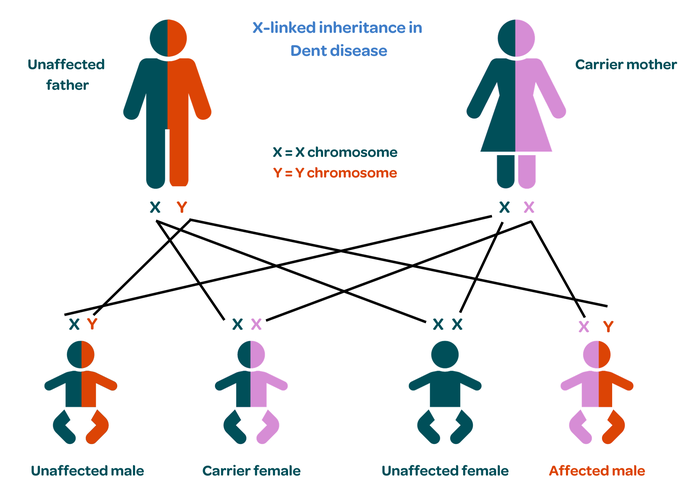What is Dent disease?
Dent disease is a very rare kidney condition that is caused by an excess of calcium and proteins in the urine and can lead to kidney stones. It is named after Professor Charles Dent who first identified the pattern of symptoms in 1964, although it was not formally named until 1990.
Dent disease only affects males and only around 300 cases have been identified worldwide.
What are the signs and symptoms of Dent disease?
Dent disease is very variable. Some people have very few, mild symptoms and maintain normal kidney function throughout their life. Other people are more severely affected.
Symptoms tend to develop gradually in childhood and early adulthood.
Some people with Dent disease have kidney stones. These can cause pain in the lower back or groin (renal colic), which can come and go in waves and range from mild to severe. Repeated kidney stones can cause blockages in the urinary system, which can eventually lead to kidney damage.
The kidney stones can cause blood in the urine (haematuria). The urine may look red or dark brown (like a cola drink). Haematuria may be invisible to the naked eye but it can be seen under a microscope (microscopic haematuria) or when tested by dipping a specially treated paper strip into your urine (urine dipstick).
Other common symptoms include increased thirst and excessive urination.
What causes Dent disease?
Dent disease occurs due to a problem with the kidneys’ filtering system, which causes too much protein to be lost in the urine instead of being reabsorbed into the bloodstream.
This fault also causes too much calcium to be left behind in the urine, which builds up in the tiny tubes of the kidneys (tubules), like hard water furring up in a kettle. Over time these calcium deposits can turn into kidney stones, which can block the urinary system and cause tissue damage.
How is Dent disease diagnosed?
Dent disease is usually diagnosed when a urine test finds protein or calcium. This may be a routine test if there have not been any noticeable symptoms.
An ultrasound scan may show calcium deposits or stones in the kidneys.
An examination of any kidney stones that have been passed out of the body can confirm the diagnosis, but this is not always necessary.
Dent disease can also be confirmed by genetic testing.
Does Dent disease affect other parts of the body?
Dent disease can sometimes cause rickets (softening of the bones). This can be mild and only be discovered on X-rays without causing any noticeable problems. Some cases are severe, especially in young boys. The bones can become very painful which can delay walking. The child may cry when picked up and avoid using the limb.
A small number of people may have mild learning difficulties and reduced growth rates.
Does Dent disease run in families?
Dent disease is a genetic condition so it can be inherited. It is caused by an abnormality or mutation in one of two genes, CLCN5 or OCRL. Sometimes, people with mutations in CLCN5 are referred to as having Dent Disease type 1 and those with mutations in OCRL as having Dent disease type 2. Both genes occur on the X-chromosome.
Females have two X chromosomes, so the healthy gene compensates for the damaged one. However, males have only one X chromosome and one Y chromosome, so they have no backup if the gene is damaged. This is why only males develop Dent disease.
Females with one damaged gene are known as carriers. There is a one in two chance they will pass the damaged gene onto any children. If they pass it onto a daughter, she will also be a carrier. If they pass the gene onto a son, they will develop the condition.
Affected men cannot pass the condition onto their sons as they inherit the Y chromosome but will pass it onto their daughters who will be carriers.
In some cases, a genetic change occurs spontaneously. This can cause Dent disease to develop in someone whose parents who do not have the mutated gene. This new mutation can then be passed onto the next generation.

How is Dent disease treated?
There is no specific treatment for Dent disease, so management is aimed at reducing symptoms to improve quality of life.
Vitamin D supplements can help to prevent or treat rickets, but the dose needs to be carefully monitored to avoid excess calcium loss in the urine.
Thiazide diuretics (a type of water pill) may be prescribed to reduce the amount of calcium that passes out of the body in the urine.
Small kidney stones that are not causing a blockage or any pain do not need to be treated. They may be passed naturally in the urine with little or no pain and may just require monitoring with ultrasound scans to check their location. However, large stones may require surgery, especially if they are at risk of causing blockages in the kidney and leading to long-term damage.
There are various ways that stones can be removed depending on their size and location:
- Lithotripsy – uses sound waves to break the stones into smaller pieces that can then be passed in the urine.
- Endoscopy – involves passing a flexible fibre optic ‘telescope’ called an endoscope up the urinary system to see the stone directly. Special tools built into the endoscope are used to capture or break up the stone.
- Open surgery – to remove stones is rarely needed.
Around half of all people with Dent disease develop kidney failure by the age of 50. Dialysis and/or transplant may then be needed. It is very rare for kidney failure to occur in children with Dent disease.
Where can I get more information or support about Dent disease?
We are not aware of any UK-based support groups for Dent disease. If you know of any Dent disease patient groups, please let us know so we can share their details.

Publication date: 11/2023
Review date: 11/2026
This resource was produced according to PIF TICK standards. PIF TICK is the UK’s only assessed quality mark for print and online health and care information. Kidney Care UK is PIF TICK accredited.